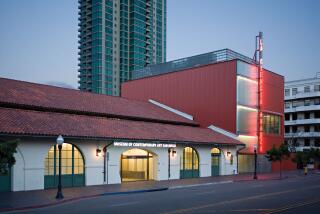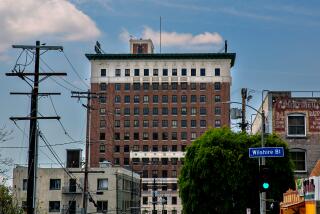Manchester vs. Port (Again) : Pending Sale of $100 Hotel Option for $15 Million Raises Eyebrows
- Share via
Developer Doug Manchester’s $15-million plan to sell his option to build a third waterfront hotel may be derailed, at least temporarily, by objections from public officials who feel that Manchester is speculating on public land.
The proposed sale, in which Manchester would transfer the right to build a third hotel adjacent to the proposed convention center to Seaport Manfred Company Inc., is contingent on the San Diego Unified Port District’s approval of the deal next week.
However, commissioners and other port officials said they doubt that the timetable will be met, partly because Mayor Maureen O’Connor has asked that action on the proposed sale be postponed to give city officials more time to review it.
“It’s probably not going to happen next week and there’s some question whether it will happen at all,” Commissioner William Rick said.
The developments jeopardizing Manchester’s proposed hotel option sale occurred as the Port District’s dispute with Manchester took a new direction.
Last week, city and port officials were angered by Manchester’s refusal to disclose the price that Seaport Manfred, which owns Seaport Village, planned to pay for the hotel option. Faced with that opposition, Manchester, who had argued vigorously that he was entitled to privacy in the deal, revealed Monday night that the sale price was $15 million--touching off accusations from O’Connor and others that he was seeking to attain a “windfall” through improper speculation on public property.
“It’s a very good deal for Mr. Manchester and a very good deal for (Seaport), but it doesn’t look like such a good deal for the public,” said O’Connor, who previously served on the Port District’s Board of Commissioners and has often clashed with Manchester over the waterfront development.
“The fundamental question is whether people should be allowed to speculate with options on public land,” Port Commissioner Louis Wolfsheimer said. “We gave him the option for $100 to build a hotel, and now, without building that hotel, he wants to walk away with $15 million. If he builds the hotel and makes millions, that’s fine. But he shouldn’t make that kind of a profit like this.”
Under Manchester’s proposed deal with Seaport Manfred, Manchester would receive a non-refundable $1-million payment on Jan. 21 if the Port District has approved the deal by then. Seaport Manfred would pay the remaining $14 million to Manchester in March, assuming that the deal moves forward with both the port and the Hyatt Corp., which is to manage the third hotel.
If the port commissioners do not act on the matter at their meeting next Tuesday, the proposed sale would be void because of the Jan. 21 deadline, according to Chris Neils, Manchester’s attorney.
“We still believe that we ought to be able to get approval next week and hope that happens,” Neils said. “If it doesn’t, I don’t know what would happen next. The parties presumably could make new arrangements, but whether that would happen, I don’t know.”
For the last week, O’Connor and port officials have engaged in an escalating verbal war with Manchester.
On one side, the mayor and some port officials argue that Manchester would, in O’Connor’s words, receive an “obscene profit . . . through speculation” on an option to build a hotel on public property that he acquired from the port in 1983 for $100. In short, their argument--admittedly an oversimplification of a complex issue--is that Manchester is trying to parlay a $100 option into a $15-million profit.
In response, Manchester argues that it is “ludicrous beyond imagination” for his opponents to argue that the option cost him only $100 and accuse him of speculation. In order to obtain that option on the 4.75-acre parcel, Manchester emphasizes, his company, Torrey Enterprises Inc., agreed to build the twin-tower Hotel Inter-Continental on the waterfront site, gave the port 12 adjacent acres to build the convention center and spent more than $1 million in planning on the proposed third hotel.
That $200-million-plus investment by Torrey, Manchester argues, is the major reason that the third-hotel option is valuable today.
Turning that argument around, O’Connor and port officials contend that the proposed convention center is what enhanced the value of both the option and the profitability of the Inter-Continental. Thus, what is left is a developmental equivalent of the chicken-and-egg argument.
From Manchester’s perspective, the proposed sale is a “win-win situation that benefits everyone”: The city and port get the third hotel built, Seaport Manfred can develop the hotel in connection with its plans to expand Seaport Village, and Manchester himself makes a profit. Since the proposed option sale involves private, not public, funds, it should make no difference to the port, Manchester argues, whether Torrey or Seaport builds the third hotel.
“There’s nothing illegal about making a profit,” Manchester added.
At least one port commissioner--Daniel Larsen--agrees with Manchester.
“I don’t see how we can stop somebody from selling an asset or trying to make a profit,” Larsen said. “From the port’s standpoint, we might get a better deal and be in a stronger position if Seaport (builds the hotel), because I think they’re much more financially stable than Doug Manchester.”
O’Connor, however, says that “a whole lot of questions have to be answered” before she can be persuaded to recommend that the city’s three Port District commissioners support the proposed sale. One of the major questions, the mayor said, is whether Manchester plans to proceed with a lawsuit that he filed against the port last year in which he alleges that delays in the convention center’s construction have economically harmed the Inter-Continental.
The mayor and some port commissioners also expressed concern that Manchester’s request that the port, as part of the hotel-option sale agreement, suspend various “performance deadlines” regarding completion of the third hotel.
Noting that Manchester faces a Feb. 27 deadline for presenting the port with preliminary plans for the third hotel, some skeptics have questioned whether the developer is seeking to sell the option because of an inability to meet that target. Neils, however, said that Torrey “has the ability to meet that deadline and will meet it” if the proposed sale is not consummated.
In a report to the port commissioners, Port Director Don Nay raised concern over the fact that the option sale is set to close in March, after the port presumably would have already agreed to Manchester’s requested changes in the contract concerning the third hotel.
Perhaps the best summary of the dispute came from Rick, who characterized it as merely the latest chapter in the troubled legal history of the convention center and surrounding developments. In addition to his suit against the port, Manchester also has sued the Hyatt Corp. in an attempt to nullify the hotel chain’s pact to run the third hotel. Seaport Manfred, though, has said that, if it acquires the option, it wants Hyatt to manage the hotel.
“In the end, like with so much else in this whole mess, I suspect that somebody in a black robe will eventually sort it all out,” Rick said.
More to Read
Sign up for Essential California
The most important California stories and recommendations in your inbox every morning.
You may occasionally receive promotional content from the Los Angeles Times.













